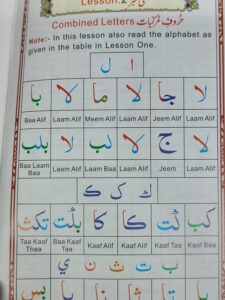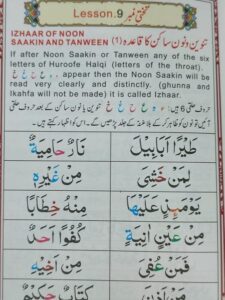A basic learning tool used mostly in Islamic culture, Noorani Qaida helps in understanding the correct phonetics of the Arabic alphabet. Since it systematically provides new concepts related to the Arabic alphabet, letters, and phonetics. It is chosen by people who are new to reading the Quran.
Table of Contents
ToggleWhat is Noorani Qaida?
This product known as Noorani Qaida is specifically aimed at illiterate children. New Muslims who have recently embraced Islam and want to learn the Quran. It sets the students to the Arabic Alphabet, Vowel Diacritics, and other essential elements of Quran recitation known as Tajweed. The coordinative technique of the book ensures that learners master the skills of reading Arabic before introducing them to the Quran.
Various components of Noorani Qaida The lessons of Noorani Qaida are:
- Arabic Alphabet: Teaching the various Arabic letters, and each letter’s distinct sound. And how to write each of the letters is the initial step in the book.
- Harakat (Vowel Signs): The following step presents the short vowels (Fatha, Kasra, and Damma). This is very important for proper pronunciation.
- Tanween (Double Vowels): Tanween also adds more vowel sounds that are very vital while reciting the Quran.
- Madd (Prolongation): Madd teaches how to prolong some of the sounds it is part of Tajweed.
- Sukoon and Shadda: These concepts are important in understanding how to pause and lay a letter, with consideration on the letter (Shadda).
- Joining Letters and Words: This section also assists learners in balancing speed in forming letters, and words, and their fluency and correct pronunciation of the words.
- Tajweed Rules: The primary aspect of Tajweed is incorporated to enable learners to develop the right pronunciation and tone as essential for Quran recitation.


How to Learn Noorani Qaida
- Find a Qualified Teacher: Studying with a qualified teacher, either face-to-face or virtually, is highly advised. They can explain in detail and additionally help to correct pronunciation and certain misunderstandings.
- Regular Practice: Thus, the most important principle derived from the literature is that when working with qualitative research. It is crucial to be consistent. More often the kid’s practice assures that the learned lessons are well understood and hones their fluency in reading the Arabic language.
- Listen and Repeat: I praise the necessity to listen to correct pronunciation and try to make the same since correct and timed phonemes and allophones are fundamental.
- Use Audio and Visual Aids: As for the classroom presentation and learning. There is a great variety of video and audio materials to add use to the process. These can be; applications, videos, and other interactive resources.
- Focus on Tajweed: Further, it is significant to mention Tajweed rules. That is significant in the reading of the Quran in the appropriate manner.
Benefits of Learning Noorani Qaida
- Foundation for Quranic Recitation: It is the best way to enable the reader to understand how to read the Quran correctly and even at great speed.
- Understanding Arabic Letters and Sounds: It enables the learners to get an understanding of the way the Arabic language sounds.
- Spiritual Connection: In Islam, it is considered good to master a skill that enables one to read correctly the holy Quran as this makes one converge closer to Allah.
- Acquiring Qaida is beneficial for every person willing to read or even comprehend the Quran and the Arabic language. It is a process that takes a lot of time, effort, and constant work. But its yields on the levels of spiritual and educational development are immense.
Studying Qaida is helpful to anyone who wants to be able to read the Quran and learn how to read Arabic. It is a process that must be carried out with much fervor and proper practice time. That will yield results spiritually, academically, and otherwise.

